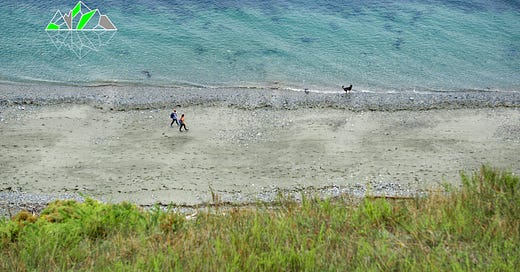I’m Ian Morse, and this is Green Rocks, a newsletter that doesn’t want dirty mining to ruin clean energy.
It’s been a hefty week. Many have their eyes locked on the US election results. Miners are still shoveling up ore all over the world, a lot of it destined for voters and consumers in the US. Regardless who wins, mining will occupy more and more of policymakers and communities’ lives. We can all use a break every once in a while.
I’ve collected some news stories and other great tools to keep your mind above water, filling your brain with a mix of hope for our 🌲🥦🚴🏻♀️🚃♻️🐝 future and information to arm yourself for the transition ahead. I’ll keep the Eye on Industry section toward the bottom in case bad news isn’t something you’re looking for today.
Investors controlling $14 trillion — more than China’s GDP — have warned Australia’s biggest miners (also some of the world’s biggest miners) that the companies’ continued destruction of Indigenous sites is not something they want to keep funding.
Chile’s citizens voted overwhelmingly to rewrite their constitution, which dates back to the violent, US-supported, military dictatorship of the 1980s. Areas that have neighbored mining projects for decades showed some of the highest support for the rewrite. Copper miners aren’t happy that the country’s rules are subject to change.
Highly recommend:
Citizens of Tonga are organizing to question their government’s plans to endorse seabed mining. The government has sponsored an exploration license for DeepGreen, a Canadian company linked to a failed seabed mining project in Papua New Guinea that left the government in heavy debt.
Shared this last week, but I want to make sure you don’t miss it. It’s a brilliant project led by an anthropologist I really respect, Anna Tsing. I met her just before the pandemic hit, and one of my first stories in Indonesia took place in a village where she had done research in the 1990s.
The project is Feral Atlas, or what happens to the natural world when humans start building. It’s your choice whether to graze or drill deep into all the videos, poems and essays.
Australia has agreed to investigate the health and safety concerns of the Panguna mine in Bougainville, an island that voted for its independence two decades after the mine helped ignite a civil war. The mining company, Rio Tinto, has also agreed to enter discussions about cleaning up the mine that it left.
The Business and Human Rights Centre keeps tabs on several metals critical to clean energy technologies. Its Transition Minerals Tracker updates maps and stories on mining and processing around the world, and it uses these data to assess whether supply chains are as sustainable as their products try to be (see Eye on Industry below). Also, Green Rocks is listed second on its resources page!
The Union of Concerned Scientists is exploring how we can make sure that our energy technologies don’t end up creating more waste and fueling unnecessary mining. They’ve recently released four pieces on the circular economies of solar panels, wind turbines, and energy storage devices.
Salps — the free-floating, mucus animals often in the deep ocean — taught scientists how to optimize solar energy production.


If you haven’t already, check out the map of all the Green Rocks stories that we’ve either just barely mentioned or attempted a deeper excavation. Observers will notice there’s not much connection between the countries who created the climate crisis and those who are tasked with saving it.
Eye on Industry
The US formally exited the Paris climate agreement. A Biden win and Democratic Congress may bring the US back, but it may take longer for other countries to trust the world’s most powerful economy is in solidarity with the rest of the world.
“We’re about to see a tidal wave of old EV batteries hit China,” Ada Kong of Greenpeace told Reuters. The NGO says China needs to step up its battery recycling capability dramatically.
Also, check out my PV Magazine piece (paywall) on solutions to the carbon intensity the aluminum industry. The energy transition needs more aluminum than any other metal, as Green Rocks learned in the bauxite excavation. This piece focuses on the 2% of global carbon emissions from the industry.
A joint study in France found that renewable energy companies — including car and mining firms — are not meeting standards set by the country’s landmark “Duty of Vigilance” law. The law places some responsibility on French companies for environmental and human rights abuses in their supply chains, and it threatens legal action if no action is taken. Among the companies assessed were EV maker Renault and miners Eramet and Imerys.


Thanks for reading! I’m Ian Morse, and this is Green Rocks, a newsletter that doesn’t want dirty mining to ruin clean energy.
These topics are relevant to anyone who consumes energy. If you know someone like that, share freely!
Subscribe with just your email, and weekly reports with news round-ups and original reporting will come directly to your inbox. It’s free! (for now)










